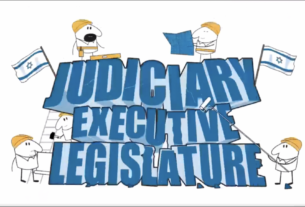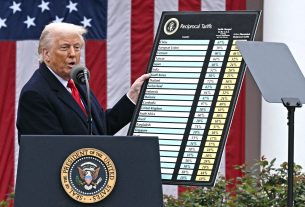
(JTA) — My favorite moment of “Ted Lasso,” the hit TV show about a relentlessly kind American hired to coach professional soccer in London, comes when Ted berates his star player for sitting out practice.
“You’re sitting in here, you’re supposed to be the franchise player, and yet here we are, talking about you missing practice,” Ted says. “Not the game. We’re talking about practice.”
The joke behind the scene is that Ted’s monologue is an almost word-for-word reenactment of a famous 2002 rant by NBA great Allen Iverson in which he said the word “practice” 22 times. Unlike Ted Lasso, however, Iverson wasn’t talking about the importance of practice; he was complaining about being criticized for missing it.
According to Iverson, practice didn’t matter. Ted said it did.
And that divide explains the divergent reactions in the Jewish community to Ben & Jerry’s boycott of Israeli settlements.
Let me explain.
On its own, the fact that an American ice cream company announced that it would eventually stop selling its product in what it termed “Occupied Palestinian Territory” — meaning Israeli West Bank settlements — is not going to spell doom for the Jewish state.
Ben & Jerry’s has only a 12% market share in Israel, less than a third of the leading company’s sales, and settlers account for fewer than 10% of Israelis. New York City Mayor Bill de Blasio was off base when he said the decision would “undermine the economic reality” in Israel.
So why has the Ben & Jerry’s statement caused such consternation among Israeli leaders and their advocates?
Prime Minister Naftali Bennett decried the company as an “anti-Israel ice cream.” Foreign Minister Yair Lapid labeled the decision a “surrender to antisemitism” and called for Ben & Jerry’s to be prosecuted. Kosher supermarkets in the U.S. have taken Ben & Jerry’s off their shelves. An Australian kosher authority has removed the brand from its list of approved products. Activists are calling on the company that certifies Ben & Jerry’s as kosher to remove its imprimatur.
Some are reacting that way no doubt because, like Bennett, they want to erase any distinction between the settlements and Israel. Throughout his political career, Bennett has championed annexing the settlements into Israel and vehemently opposed a Palestinian state. So he has portrayed a boycott of the settlements as a boycott of the entire country, even if that isn’t actually true.
Caroline Glick, a staunchly right-wing American-Israeli columnist, went further, calling Ben & Jerry’s “Nazi collaborators” and “schmucks.”
But why are centrist Israelis like Lapid, who has said he supports a Palestinian state, also raging at the boycott? Why did the Anti-Defamation League, which also supports the establishment of a Palestinian state, publicly criticize Ben & Jerry’s?
They appear to fall on the Ted Lasso side of the “practice” debate: that preparation for the game, the real thing, matters, even if it seems insignificant by itself.
So no, it is not an immediate existential threat to Israel that Chunky Monkey will no longer be sold in Efrat. But supporters of two states who nonetheless criticized Ben & Jerry’s have signaled that they aren’t worried just about this decision — they’re anxious about what it portends.
Pay attention to what Lapid wrote. He didn’t quite call the boycott itself antisemitic — he called it a “surrender to antisemitism, to BDS.” Same with the ADL, which said the decision is bad because it is “feeding into dangerous campaigns that seek to undermine Israel.”
In other words, they think the settlement boycott is bad because it provides fuel for anti-Israel and antisemitic forces, and creates a steppingstone to a complete boycott of Israel — practice for the real thing. Indeed, the Boycott, Divestment and Sanctions movement, or BDS, which advocates a full Israel boycott, celebrated the decision.
Plenty of Israelis and Israel activists say the opposite: That no, this is not a boycott of Israel as a whole, and it’s misleading and dangerous to make that conflation.
Those people side with Iverson in the debate: Practice is practice, and the game is the game, don’t waste your energy confusing one thing with the other.
Some centrist and left-wing supporters of Israel are taking the Ben & Jerry’s boycott as an opportunity to stress the distinction between the settlements and Israel’s recognized borders. In a tweet about Ben & Jerry’s, Einat Wilf, a centrist former Israeli lawmaker, noted on Twitter that agreements between Israel and the European Union also exclude the settlements, and that unless and until they are annexed, “the territories are not part of the sovereign state of Israel.”
Jeremy Ben-Ami, founder of J Street, which opposes the settlements and supports Israel as a Jewish state, said it was “over the top and counterproductive” to refer to the decision as antisemitism.
“Ben & Jerry’s is drawing a distinction between commercial transactions in the sovereign State of Israel, and those in the territory it occupies,” he tweeted. Calling that boycott antisemitic, he added, “only undermines the critical fight against genuine antisemitism.”
Ben & Jerry’s has earned a reputation for cheerleading progressive causes. In a different era, it put out a special flavor celebrating Israel. Now it’s boycotting the settlements. So this may be a sign of where America’s left-wing consensus is headed.
But however they feel about Ben & Jerry’s, both supporters and opponents of the ice cream maker’s decision have made clear that it is a milestone in how Americans relate to and discuss Israel and its policies.
As Iverson said of practice, “I’m not shoving it aside, you know, like it don’t mean anything. I know it’s important. I do.”




